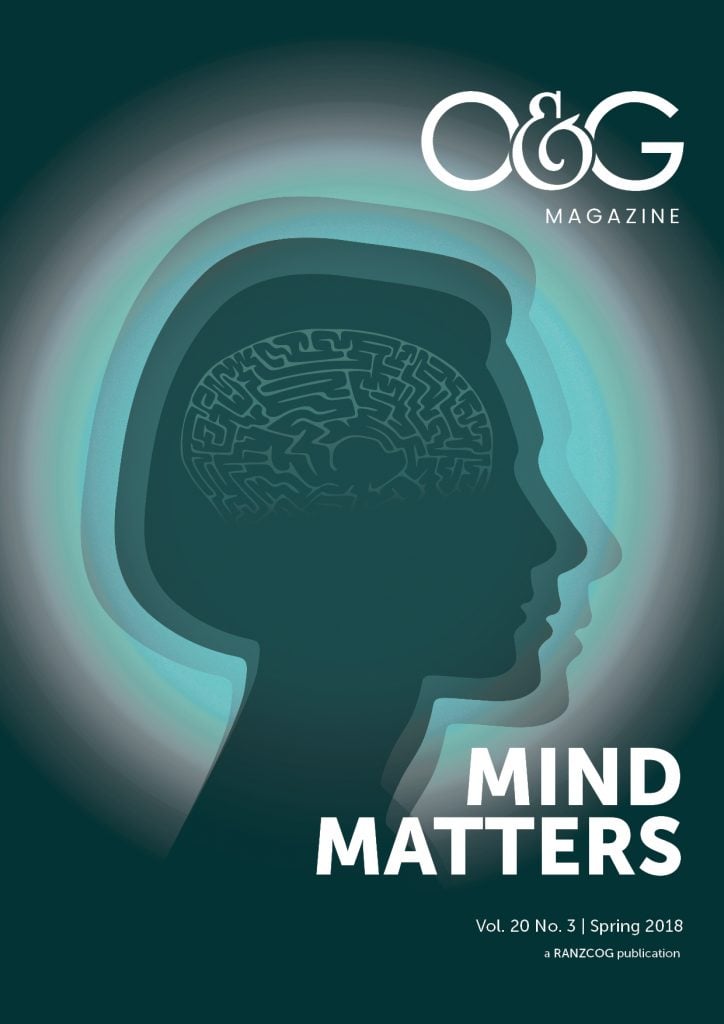The perinatal period may be defined as the time between conception and one year postpartum. For many women and their partners, it is a time of great joy, a journey of excitement and happiness. Pregnancy and the arrival of a baby are celebrated in all communities. A newborn is a source of wonder, love and adoration by parents, family and friends. The societal expectations of a new mother (and a new father) are that everything is good, happy, and, in particular, that their emotional health is stable. It isn’t always so.
One in five women and one in ten men experience perinatal anxiety and/or depression. The disease may arise de novo or be an exacerbation of a pre-existing illness. The perinatal period is a time of great adjustment – biological, psychological and social change. For many, this pathway is negotiated with minimal disruption. For a significant minority, pregnancy, birth and early parenting can lead to distressing emotional turmoil. This may manifest in a continuum of symptoms from mild anxiety and the ‘baby blues’ to overt mental illness, depression, post-traumatic stress disorder, adjustment disorder or psychosis. In many countries, including Australia and New Zealand, suicide is a leading cause of maternal death.
It is self-evident in every other aspect of medical practice that ‘you won’t know if you don’t ask’. Screening for mental health disorders in pregnancy has been demonstrated to be effective and is a key recommendation of the Australian National Perinatal Mental Health Guideline.1 In November 2017, the Obstetrics Clinical Committee of the Medicare Benefits Schedule (MBS) Review Taskforce, with representation from RANZCOG, recommended that screening for mental health disorders, substance misuse and domestic violence be part of routine care. The importance and complexity of looking after women with mental health disorders is also now recognised in the MBS Schedule. To the best of our knowledge, Australia is the first country to legislate the requirement to screen for mental health conditions in pregnancy, with modification of existing item numbers and the introduction of new ones.
Mandating screening is a first step. For this to be successful, there needs to be adequate training. There must be clearly defined and accessible pathways for those who screen positive. Validated screening tools include the Edinburgh Postnatal Depression Scale (EPDS),2 and an antenatal psychological screen, the ANRQ,3 which assesses a woman in the context of her personality, life experiences, and social and community environment. This is new territory for many practitioners, often outsourced to midwifery staff, but it needn’t be so. The hope is that routine screening will change the culture of obstetric practice, recognising that mental health is an integral part of obstetric care.
Does mental health really matter? In 1991, a 32-year-old woman gave birth to her first son. While the pregnancy was unplanned, it was wanted. She was happily married, economically secure, intelligent and healthy. She embraced pregnancy and was keen to have an intervention-free birth experience. That wasn’t to be. At 34 weeks, her blood pressure went up and she was hospitalised, medicated and told to stop work. She was induced at term and had tonic contractions, an epidural and a forceps delivery. A beautiful baby boy was born to two deeply traumatised parents. The doctors and midwives were amazing. They saved the woman’s life… but they never asked her how she felt. In fact, she had developed an anxiety disorder during pregnancy. She had post-traumatic stress disorder after the birth and spent the next two years with anxiety, depression and suicidal ideation. Her husband didn’t understand. He went back to work, not realising that when he left she would sit on the kitchen floor, rocking herself, paralysed by anxiety and thoughts of self-harm.
The diagnosis of postnatal depression was made by chance. The journey to recovery included admission to a mother and baby unit for six weeks, medication, psychotherapy and couple counselling over the next five years. A lot of damage was done because nobody asked.
That woman was my wife, Cathie, and that man was me. This is not a condition that discriminates. It can affect any pregnant woman and the implications are profound. Mental healthcare in pregnancy is our responsibility and should be as integral to obstetric care as blood pressure, gestational diabetes and the complexities of caesarean and vaginal birth. Your patient is your mother, your sister, your daughter, yourself. Mental healthcare is not the sole domain of midwives. It is the responsibility of obstetricians and GPs. It should not be outsourced.
Cathie and I recovered and now have five children. We are happy and content, but permanently scarred by the events of 26 years ago. It could have been better. We have channelled our passion into the Gidget Foundation, a charity to raise awareness of emotional wellbeing in pregnancy and early parenting. Gidget was a real woman with a loving family, husband and friends. She took her own life 17 years ago, suffering from undiagnosed postnatal depression. The Foundation now runs screening programs in private hospitals,4 offering free consultations with psychologists, psychiatrists and social workers, both face to face and via telehealth. We hold numerous events to raise awareness of a disease that has hitherto received insufficient attention.
Make mental healthcare part of your obstetric practice. Ask about emotional wellbeing at every visit. Then listen to the answer. You can identify high blood pressure, perform an instrumental delivery and manage a complex pregnancy or birth. FRANZCOG and DRANZCOG qualify you for that, but being a doctor qualifies you for so much more. You can identify, manage and support women with mental illness in pregnancy and beyond. If we make the care of emotional wellbeing integral to our practice, the culture around pregnancy, birth and parenting will change, for the betterment of all.

References
- Austin M-P, Highet N and the Expert Working Group. Mental Health Care in the Perinatal Period: Australian Clinical Practice Guideline. (2017) Melbourne: Centre of Perinatal Excellence.
- Cox J, Holden J, Sagovsky R. Detection of Postnatal Depression: Development of the 10-item Edinburgh Postnatal Depression Scale. British Journal of Psychiatry 1987;150(6):782-786. doi:10.1192/bjp.150.6.782.
- Austin, M-P, Hadzi-Pavlovic D, Leader L, et al. Antenatal screening for the prediction of postnatal depression: validation of a psychosocial pregnancy risk questionnaire. Acta Psychiatrica Scandinavica 2005;112:310-317.
- Kohlhoff J, Hickinbotham R, Knox C, Roach V, Barnett A. Antenatal psychosocial assessment and depression screening in a private hospital. Aust N Z J Obstet Gynaecol.





Leave a Reply